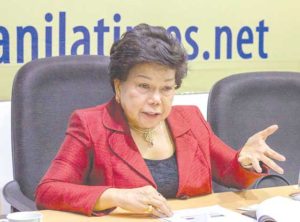INVESTMENT momentum in economic zones is set to keep going whoever wins today’s elections, but to sustain investor interest for the long term, the government will need to expand infrastructure and ease the process of doing business in the country, the head of the Philippine Economic Zone Authority (PEZA) said.
In a roundtable interview with The Manila Times editors, PEZA Director General Lilia de Lima said PEZA’s board members and management will work on a policy that will shorten the process of granting building permits for businesses to three days upon the applicant’s completion of all requirements, from the current 15 days.
The board, she said, will convene to discuss the ‘three-day’ rule right after the elections, and try to get it ready for implementation by the third quarter of 2016.
“Ease of doing business – that, to me, is number one, to really bring in investors to PEZA,” De Lima told the editors. “But for the whole country, it really is infrastructure, that is the number one priority.”
The National Competitiveness Council (NCC) recently said it was confident the country could climb to the 63rd spot this year in the International Finance Corp (IFC)-World Bank’s global rankings of countries that offer ease of doing business.
The NCC is working toward reducing steps and days in “starting a business” as well as in “paying taxes.” The body targets to reduce the procedures in starting a business to “six steps and eight days” this year, and further to “three steps and three days” by 2017, compared to the 16 steps and 29 days to secure a new business in the country.
Also this year, the NCC co-chair said the procedure in paying taxes is expected to be reduced to a total of 13 payments with less than 193 hours alloted to settle taxes, compared to the 36 payments needed in more than 193 hours in 2015.
For an archipelago with more than 7,100 islands, the Philippines lacks airports, seaports, railways and roads, an observation often mentioned by investors and analysts, and De Lima said the country needs more of these for faster and cheaper transport of goods and services.
The government may also have to offer more, if not keep the current, incentives to attract investors to relocate their hubs to the Philippines, she said.
Opposed to rationalization of incentives
For the PEZA director general who has run the agency since 1995, the Rationalization of Fiscal Incentives Bill proposed in the House of Representatives is misaligned with the country’s drive to push for more investments.
The fiscal incentives rationalization bill aims to lay out a single tax incentive scheme for all sectors in place of the current grants given by investment promotion agencies (IPA) like PEZA.
“We have always opposed the rationalization of incentives -- that law which would rationalize tax holidays. This rationalization of all versions of incentives would cut what the PEZA is doing. Why be unhappy with an agency that’s doing good? Lift the others to that category, but do not chop off what this one has,” de Lima said.
It’s “good [to rationalize incentives] if we have infrastructure, then remove [them eventually]. But for now, what is it that we can offer in exchange [for that in order to attract investors]?”
PEZA, best worldwide
In a study commissioned also by the IFC and the World Bank, the PEZA emerged as the outstanding agency worldwide in facilitating economic zones in terms of best practices.
But this stature is threatened by the Asean integration move, especially if the PEZA does not continuously improve its practices, de Lima warned.
“I’m worried about it because of the Asean integration. We have the edge, the people. What can we do? ... In Indonesia, inside their zones, they process building permits for 60 days, and now, they have reduced that to three days. Today in PEZA, that takes 15 days. Why can’t we reduce it to three days?”
From 1995 up to end-2015, the PEZA generated P3.157 trillion worth of investments in its various economic zones, while also earning $606.974 billion in exports and creating a total of 1.172 million jobs.
These substantial numbers were all thanks to PEZA’s generous incentive scheme “which is comparable with the rest of the region,” as well as unequalled service for 24 hours a day, 7 days a week, automated processes and one-stop shop service, simplified registration processes, and exemption from local government permits and fees, de Lima said.
PEZA is an agency under the DTI, which promotes investments, extend assistance and grant incentives to export-oriented manufacturing and IT services facilities inside the PEZA special economic zones.
De Lima said PEZA has managed to remit a total of P16.621 billion to the government without having received a budget from the government.
De Lima attributed these achievements to the good performance of 3,700 local and foreign locators – whether large and foreign or small and medium Filipino enterprises – who were pleased with their move into PEZA’s economic zones.
Samsung, Toshiba, STMicroelectronics, Texas Instruments, and NXP Semiconductors were some of the companies she cited.
Kristyn Nika M. Lazo


